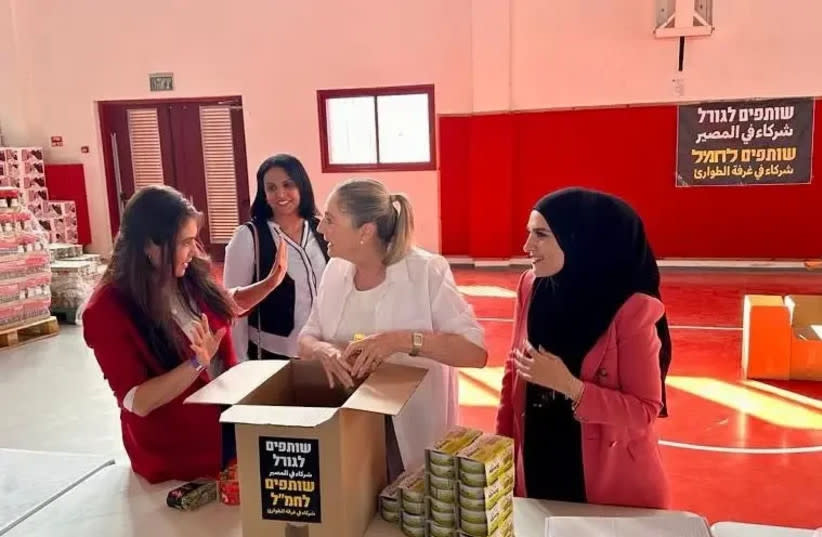Developing and sustaining positive, cooperative relations between Israel’s Arab and Jewish citizens has long been of paramount importance, especially after October 7, 2023.
As Israelis continue to deal with the repercussions of the murderous Hamas attack, the atmosphere in Israel remains relatively calm. Fears of a reprise of the violence between Arab and Jewish citizens that erupted in May 2021, after Hamas fired rockets and missiles into Israel, have not materialized. Still, many who are long immersed in building a shared society, where furthering mutual understanding and erecting partnerships have proven essential to strengthening majority-minority relations and Israel’s democracy, are deeply concerned.
“Most of us are pessimistic and think the worst is yet to come,” says Michal Sella, executive director of Givat Haviva, one of the leading organizations fostering Jewish-Arab relations. Seventy-two percent of Jewish and 50% of Arab citizens are currently pessimistic about the prospects for Jewish-Arab coexistence in Israel, while 21% of Jews and 27% of Arabs are optimistic, according to a new Givat Haviva survey.
“We are all Israelis. We feel very scared and unsafe,” Sella continues. “Israel is a very small country. The levels of anxiety at home are very high. It affects the way we see each other, the way we live our lives, the way we raise our children. It really affects our reality.”
Changes in attitudes since war began
The survey found that 77% of Jews and 62% of Arabs consider their sense of personal safety to have changed for the worse due to the events of October 7. Only 1% of Jews and 3% of Arabs said their sense of personal safety changed for the better, while 20% of each community said there was no change.

Although both Jews and Arabs were victims of Hamas – murdered by rockets fired from Gaza and by lethal terrorists who crossed into Israel – and were among those taken to Gaza, mutual suspicions have climbed sharply. The survey, carried out from December 27, 2023, to January 2, 2024, found that 34% of Israeli Jews trust most Arab citizens, while 63% do not. In comparison, 50% of Israeli Arabs trust and 29% mistrust most of their fellow Jewish citizens.
“It is normal to feel comfortable in your own group and to not reach out, especially in a time of crisis,” says Sella. Fifty-six percent of Jews polled said their attitudes towards Arab citizens since October 7 have changed for the worse, while 4% said they changed for the better and 37% said there was no change. Among Arab citizens polled, 22% said their attitudes towards Jews have changed for the worse, 6% for the better, and 49% did not change.
While the fourth Hamas-initiated conflict against Israel since the terrorist organization violently seized control of Gaza from the Palestinian Authority in 2007 risks harming Jewish-Arab relations in Israel, the Givat Haviva poll, conducted by the Midgam Institute, found a foundation on which substantial achievements in recent years in advancing a shared society can be preserved and extended.
Following decades-long efforts by nongovernmental organizations actively engaged in Jewish-Arab relations, the Israeli government, beginning in 2015, substantially invested in five-year development plans for Arab citizens, yielding significant advancements in higher education, employment, education, housing, and transportation. These programs furthered the integration of Arab citizens into Israeli society and deepened ties with fellow Jewish citizens as well as with the government.
The agreement between Jews and Arabs that interactions between the groups have positive effects is another point of hopefulness in the Givat Haviva survey. Sixty-two percent of Jews and 72% of Arabs say interactions in the workplace improve Jewish-Arab relations, compared to 27% of Jews and 11% of Arabs who say they weaken the relationships. Regarding interactions in higher education, 41% of Jews and 65% of Arabs say they improve relationships, while 46% of Jews and 15% of Arabs say they weaken them.
Fully implementing the current five-year plan, Government Resolution 550, launched in November 2021, is imperiled. Coalition members, even before October 7, were favoring cutbacks in previously approved budgets for Arab communities. The national government’s announcement last month that it plans cuts of at least 15% in established multi-year commitments to programs for Arab citizens appears to have support. The Givat Haviva survey found Jewish citizens sharply divided over the value of investing in the Arab minority. While 42% say the state should invest as much as necessary in the Arab community in Israel, 23% say the state should invest less, and 19% say the government should not invest at all in Arab citizens.
Disinvesting in the Arab minority will likely have a detrimental impact on the process of healing that is critical for Israeli Arabs and Jews, both within their own communities and in dealing with one another going forward. Mohammad Darawshe, Givat Haviva’s director of strategy, says it took 10 years to heal after 13 Arab citizens were killed by Israeli police in October 2000. And while six people were killed and hundreds injured over several days of inter-communal violence, especially in the mixed cities, in the Jewish-Arab clashes in May 2021, that healing process was interrupted by the October 7 attacks.
“The path to a better future will be long. To rehumanize each other will take a lot of work,” says Sella. Despite ominous government budget cuts, Givat Haviva has redoubled its engagement with both Arab and Jewish citizens, continuing to implement its educational programs and working with municipal leaders in both communities.
Promoting positive Jewish-Arab interactions throughout Israeli society and encouraging the integration of Israel’s Arab citizens have long been recognized by civil society organizations and the government as enormously beneficial. American Jewish organizations should be speaking out in opposition to threatened reductions in what have been, in recent years, groundbreaking initiatives and strongly support investing in Arab citizens and in Jewish-Arab coexistence programs.
Maintaining Jewish-Arab relations in Israel is an urgent imperative essential to the country’s well-being.
The writer was the American Jewish Committee’s director of media relations, 1998-2023.
